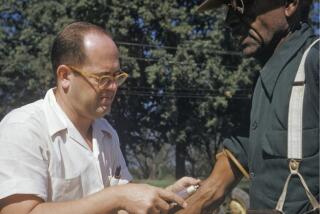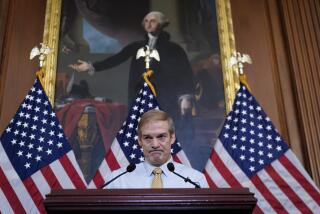75% in Editors’ Study Doubt Credibility of Newspapers
- Share via
WASHINGTON — America’s newspaper editors were told Friday that three out of four adults doubt their publications’ credibility and that, if they do not act to improve their reputation, their privileges and the size of their readership are in danger.
Those were the conclusions of a study commissioned by the American Society of Newspaper Editors and released at the group’s annual convention here.
If forced to choose one news source, the study found, Americans prefer television over newspapers by a wide margin, not only because of its ease but also because they find television more believable and less biased. The study attributed this to people’s readiness to believe something they see and hear over what they read--despite the fact that television news is usually edited and condensed more than newspaper copy.
Low Marks for Ethics
As an institution, however, people rate newspapers more highly than television. The people who work in the press, on the other hand, generally are not well thought of. Only advertising executives and used-car salesmen ranked lower than newspaper reporters and editors for honesty and ethical standards.
In general, the study found that the press is distrusted for its treatment of ordinary citizens, but supported for its treatment of elected officials.
While the majority disapproved of using unnamed sources in stories, for instance, an even larger majority supported a journalist’s right to withhold such information from the government. Most people also believe strongly in the press’ watchdog role over government and consider investigative reporting important and necessary.
At the same time, the study found that people think news reporters are too often insensitive and callous to ordinary citizens. Nearly two-thirds think “the press often takes advantage of victims of circumstance who are ordinary people.” And 78% said news reporters “are just concerned about getting a good story, and they don’t worry much about hurting people.”
Different Views on News
The study also found journalists and the public think very differently about what constitutes news and how it should be gathered.
When asked about certain kinds of stories, for instance, 60% said exit polling should “never” be used to predict the winners of elections while the polls are still open. Such predictions are a common practice among television news organizations but rare among newspapers. In another case, 68% said secret government documents concerning important national security issues should not be made public.
Many people also think “the press does not behave in such a way as to deserve its privileged status,” the study said. As an example, 71% thought the right to a fair trial is more important than the public’s right to be informed about the trial. Similarly, 71% said pretrial publicity “often makes people accused of crimes look guilty before they are tried in court.”
Other Findings in Study
Among other key findings of the study:
--Blacks generally have a lower regard for the press than other groups--and were more distrustful.
--Conservatives prefer newspapers, while liberals prefer television.
--Young people, age 18 to 24, are more likely to trust television and distrust newspapers than their elders. When the current generation ages, it is believed their attitude will reverse.
--Roughly two-thirds of Americans think the press overemphasizes bad news and what is wrong with America and de-emphasizes what is right.
--Two-thirds of the people think there is as much opinion on the front page of the paper as in any other part, and more than half believe that the reporter’s bias is evident in stories, even though they believe the reporter is trying to be objective.
Several editors said the study’s findings differed little from those of earlier studies on press credibility. They hoped, nonetheless, that this official study, along with similar surveys under way by other groups--including the Los Angeles Times--would raise awareness within the press of the public’s skepticism and concern.
The study suggested that newspapers improve their credibility by opening themselves to their communities, by treating people with greater empathy, by working harder at accuracy and fairness and, above all, by doing a better job of educating the public about the press and its procedures.
More to Read
Sign up for Essential California
The most important California stories and recommendations in your inbox every morning.
You may occasionally receive promotional content from the Los Angeles Times.










